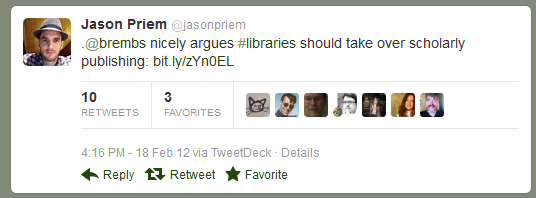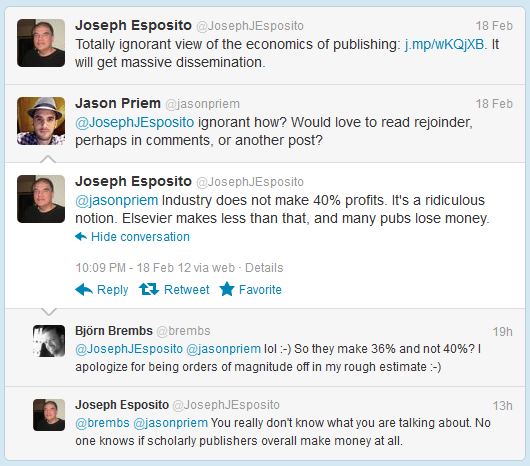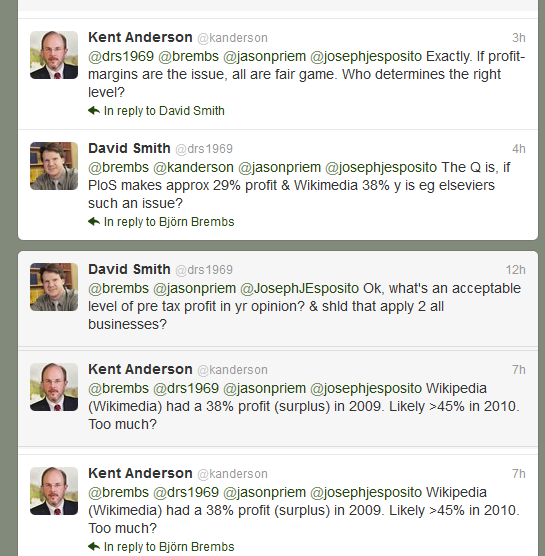Main Menu
Welcome
In the wake of the burgeoning Elsevier boycott, Richard Poynder asked the corporate publisher to "get out more", meaning they should start talking to the people they call their 'partners', namely the scholars who provide and review the articles they disseminate. Already their first official response was showing signs of questionable honesty and in an interview with Poynder, Elsevier's Alicia Wise still referred to scholar's works as belonging to Elsevier. This hardly constructive behavior became apparent again in the comments of a post by Mike Taylor. Liz Smith of Elsevier kept repeating the old “we want to do it, but we don’t want to be told to do it” argument with regard to their support of the Research Works Act and even well-tempered Mike was starting to lose his patience. From these past weeks it's thus become increasingly transparent that the corporate publishers, and especially Elsevier, are not interested in actually changing anything, but rather to stall the debate in a way that is starting to border on offensive. Obviously, corporate publishers stand to lose their profits of about 10 million US$ every single day, so there is quite a large incentive in stalling and protecting their interests.
This strategy has taken a new turn today with several spokespeople for corporate publishers attempting to derail a discussion on a viable alternative to corporate publishing, a library-based scholarly communication system. It is not difficult to understand that cutting corporate publishers out entirely is the ultimate threat to their existence and much more serious than a boycott of a single company by a few thousand scholars. In my post explaining the advantages of such a hypothetical system, I wrote in my first of 14 points:
Given a roughly 40% profit margin in academic publishing, give or take (source), the approximately US$10 billion currently being spent can be divided in 6b cost and 4b profits. If most of these funds are being spent by libraries for subscriptions, all else remaining equal, libraries stand to save about 4 billion each year if they could do the job of publishers.
This was also the only time I mentioned profits in the whole post. Thus, it is pretty clear that the exact profit margin (e.g. Elsevier 36%, Wiley 42%) isn't really the issue. The current publishing system is so dysfunctional that moving to libraries seems attractive in any case - the undisputed 4 billion in annual profits only makes it more so. The post proved comparatively popular, despite it being a weekend, and received a few Tweets like this one from Jason Priem of altmetrics fame:
Given that the post was all about functionality, it came at somewhat of a surprise (maybe, in hindsight, in shouldn't have) when Tweets appeared that started wondering about the exact profit margin:

Of course, both Jason and I clarified immediately that as long as scholarly communication functions appropriately, we don't care about profit margins:

So both from the blog post and individually we've made more than unambiguously clear numerous times that it's the current (dys)functionality of the status quo that makes us even look at profit margins and question if the money is well spent. We even wrote additional Tweets clarifying further that all we want is a 21st century scholarly communication system and that the profits currently lining shareholder pockets would be better spent investing in such a system. Yet, in what can only be described as either an insult or blatant stupidity, the following slew of Tweets came in:

One really wonders: what part of "functionality" is it that corporate publishers don't understand? If they really cannot understand the issues being explained to them at nauseam in the last decade or so, they shouldn't be in this business to begin with and any attempt to go back to business as usual now is out of the question. On the other hand, if they do understand our issues with scholarly publishing and attempt to derail the discussion by deliberately beleaguering a non-issue, they have forfeited any right to be taken seriously.
So which one is it? Honest stupidity and incompetence or deliberate stalling of progress in order to keep parasitizing taxpayers for as long as possible?
P.S.: All three individuals appearing in the Tweets above (Anderson, Esposito and Smith) post at 'The Scholarly Kitchen', a site of the Society for Scholarly Publishing, a non-profit organization representing commercial and noncommercial publishers and in practice mostly taking up the defense of corporate publishers against scholars' criticisms. The two readers of this blog may remember the instance when Mr. Anderson, an English major, tried to tell scientists how to organize their workflow and other flame bait. However, I need to explicitly exempt David Crotty from my description of TSK, as he seems to be the only one there who openly admits that he understands the issues scholars are facing and that they are legitimate, rather than stonewalling and seemingly deliberately derailing the discourse as most spokespeople for corporate publishers (not only TSK) seem to do, at least publicly.
Posted on Sunday 19 February 2012 - 22:26:42 comment: 0
{TAGS}
{TAGS}
You must be logged in to make comments on this site - please log in, or if you are not registered click here to signup
Render time: 0.0885 sec, 0.0056 of that for queries.





